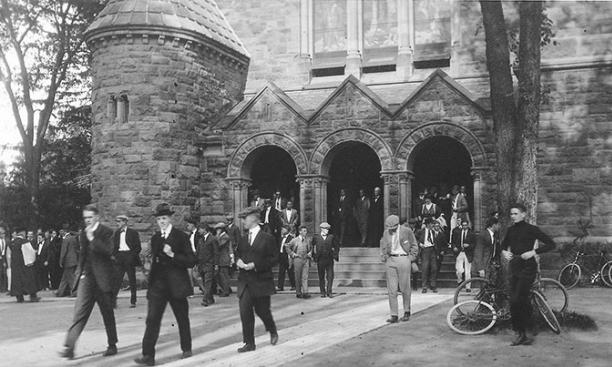
For more than 200 years, from 1746 to 1964, Princeton expected undergraduates to take part in religious services, a policy enforced by earthly rather than otherworldly punishments.
In 1905, for instance, the Board of Trustees decreed that “every undergraduate student be required to be present twice each week at morning prayers in the Chapel, unless excused by the President or the Committee on Attendance. If a student at any time falls short of this requirement by four absences, he must during the next two weeks attend four times in addition to the four times above provided for. Failure to comply with this rule will render him liable to suspension.”
Not surprisingly, this legalistic approach to worship was overwhelmingly unpopular with students, as was the nature of the weekday services themselves. As The Daily Princetonian put it in an open letter to the trustees in the winter of 1915, “daily chapel long since ceased to have any aspect of religion — unless this can be called religion: an indistinct reading of a Scriptural passage, followed by a hymn, during which process most of the undergraduates doze, some talk, and a few attempt to prevent the incident from being entirely sacrilegious. ... Compulsory daily chapel can never be anything but a mockery of religion.”
On June 14, 1915, bowing to student as well as faculty pressure, the trustees abolished mandatory chapel attendance on every day but Sunday, which, for freshmen and sophomores, remained an obligation until the 1960s. To encourage participation, morning services were moved to a later hour, a full choir was added, and short sermons were introduced.
That fall, President John G. Hibben 1882 *1893, himself a Presbyterian minister, opened the academic year by expressing confidence “that this voluntary service will tend to revive the true spirit of religion in the University,” but the gauge of religiosity would no longer be weekday chapel attendance, which, as PAW reported in October, “seemed to dwindle day by day.”
John S. Weeren is founding director of Princeton Writes and a former assistant University archivist.
